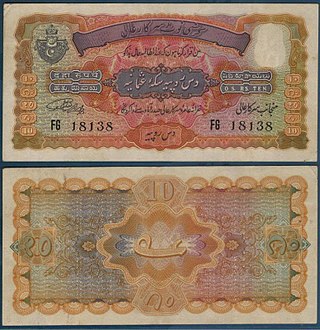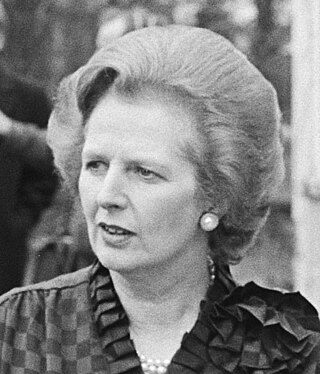
Margaret Hilda Thatcher, Baroness Thatcher, was a British stateswoman and Conservative politician who was Prime Minister of the United Kingdom from 1979 to 1990 and Leader of the Conservative Party from 1975 to 1990. She was the longest-serving British prime minister of the 20th century and the first woman to hold the position. As prime minister, she implemented economic policies known as Thatcherism. A Soviet journalist dubbed her the "Iron Lady", a nickname that became associated with her uncompromising politics and leadership style.

Leonard James Callaghan, Baron Callaghan of Cardiff, commonly known as Jim Callaghan, was a British statesman and politician who served as Prime Minister of the United Kingdom from 1976 to 1979 and Leader of the Labour Party from 1976 to 1980. Callaghan is the only person to have held all four Great Offices of State, having also served as Chancellor of the Exchequer from 1964 to 1967, Home Secretary from 1967 to 1970 and Foreign Secretary from 1974 to 1976. He was a Member of Parliament (MP) from 1945 to 1987.

Black Wednesday, or the 1992 sterling crisis, was a financial crisis that occurred on 16 September 1992 when the UK Government was forced to withdraw sterling from the (first) European Exchange Rate Mechanism , following a failed attempt to keep its exchange rate above the lower limit required for ERM participation. At that time, the United Kingdom held the Presidency of the Council of the European Union.

Norman Stewart Hughson Lamont, Baron Lamont of Lerwick, is a British politician and former Conservative MP for Kingston-upon-Thames. He served as Chancellor of the Exchequer from 1990 until 1993. He was created a life peer in 1998. Lamont was a supporter of the Eurosceptic organisation Leave Means Leave.

Sterling is the currency of the United Kingdom and nine of its associated territories. The pound is the main unit of sterling, and the word pound is also used to refer to the British currency generally, often qualified in international contexts as the British pound or the pound sterling.

Richard Edward Geoffrey Howe, Baron Howe of Aberavon,, known from 1970 to 1992 as Sir Geoffrey Howe, was a British politician who served as Deputy Prime Minister of the United Kingdom from 1989 to 1990. A member of the Conservative Party, he was Margaret Thatcher's longest-serving Cabinet minister, successively holding the posts of chancellor of the Exchequer, foreign secretary, and finally leader of the House of Commons, deputy prime minister and lord president of the Council. His resignation on 1 November 1990 is widely considered to have precipitated the leadership challenge that led to Thatcher's resignation three weeks later.

The European Exchange Rate Mechanism (ERM II) is a system introduced by the European Economic Community on 1 January 1999 alongside the introduction of a single currency, the euro as part of the European Monetary System (EMS), to reduce exchange rate variability and achieve monetary stability in Europe.

In public finance, a currency board is a monetary authority which is required to maintain a fixed exchange rate with a foreign currency. This policy objective requires the conventional objectives of a central bank to be subordinated to the exchange rate target. In colonial administration, currency boards were popular because of the advantages of printing appropriate denominations for local conditions, and it also benefited the colony with the seigniorage revenue. However, after World War II many independent countries preferred to have central banks and independent currencies.
In macroeconomics and modern monetary policy, a devaluation is an official lowering of the value of a country's currency within a fixed exchange-rate system, in which a monetary authority formally sets a lower exchange rate of the national currency in relation to a foreign reference currency or currency basket. The opposite of devaluation, a change in the exchange rate making the domestic currency more expensive, is called a revaluation. A monetary authority maintains a fixed value of its currency by being ready to buy or sell foreign currency with the domestic currency at a stated rate; a devaluation is an indication that the monetary authority will buy and sell foreign currency at a lower rate.

Foreign exchange controls are various forms of controls imposed by a government on the purchase/sale of foreign currencies by residents, on the purchase/sale of local currency by nonresidents, or the transfers of any currency across national borders. These controls allow countries to better manage their economies by controlling the inflow and outflow of currency, which may otherwise create exchange rate volatility. Countries with weak and/or developing economies generally use foreign exchange controls to limit speculation against their currencies. They may also introduce capital controls, which limit foreign investment in the country.

The sterling area was a group of countries that either adopted or pegged their currencies to the pound sterling.

The modern political history of the United Kingdom (1979–present) began when Margaret Thatcher gained power in 1979, giving rise to 18 years of Conservative government. Victory in the Falklands War (1982) and the government's strong opposition to trade unions helped lead the Conservative Party to another three terms in government. Thatcher initially pursued monetarist policies and went on to privatise many of Britain's nationalised companies such as British Telecom, British Gas Corporation, British Airways and British Steel Corporation. She kept the National Health Service. The controversial "poll tax" to fund local government was unpopular, and the Conservatives removed Thatcher as prime minister in 1990, although Michael Heseltine, the minister who did much to undermine her, did not personally benefit from her being ousted.

The United Kingdom did not seek to adopt the euro as its official currency for the duration of its membership of the European Union (EU), and secured an opt-out at the euro's creation via the Maastricht Treaty in 1992, wherein the Bank of England would only be a member of the European System of Central Banks.

Margaret Thatcher's tenure as Prime Minister of the United Kingdom began on 4 May 1979 when she accepted an invitation from Queen Elizabeth II to form a government, succeeding James Callaghan of the Labour Party, and ended on 28 November 1990 upon her resignation. She was elected to the position in 1979, having led the Conservative Party since 1975, and won landslide re-elections for the Conservatives in 1983 and 1987. She gained intense media attention as Britain's first female prime minister, and was the longest-serving British prime minister of the 20th century. Her premiership ended when she withdrew from the 1990 Conservative leadership election. As prime minister, Thatcher also served simultaneously as First Lord of the Treasury, Minister for the Civil Service, and Leader of the Conservative Party.

In the United Kingdom, the green pound was the common name for an exchange rate that was used to calculate the value of financial support within the European Union's Common Agricultural Policy until 1999.

The 1976 sterling crisis was a currency crisis in the United Kingdom. Inflation, a balance-of-payments deficit, a public-spending deficit, and the 1973 oil crisis were contributors.

"No. No. No." was the response of British prime minister Margaret Thatcher to European Commission president Jacques Delors's proposals for European integration at the October 1990 European Council summit meeting in Rome. Her remarks led to the resignation of deputy prime minister Geoffrey Howe and the ensuing Conservative Party leadership election in which Thatcher was ousted.

The Gang of 25 or the Group of 25 was a cohort of British Conservative Party backbench members of Parliament (MPs) that threatened to vote against prime minister Margaret Thatcher's 1981 Autumn Statement. The statement contained monetarist measures to control inflation. Similar measures introduced since 1979 had reduced inflation but caused job losses in the manufacturing sector.

The 1972 United Kingdom budget was a budget delivered by Anthony Barber, the Chancellor of the Exchequer, on 21 March 1972. The budget is remembered for its large tax cuts, and led to high inflation and demands for higher wages, as well as the 1976 sterling crisis when the UK government was forced to ask the International Monetary Fund for financial help. It also led the Conservative Party to abandon "Post-war consensus" policies.
The 1967 sterling devaluation was a devaluation of sterling from $2.80 to $2.40 per pound on 18 November 1967. It ended a long sterling crisis that had started in 1964 with the election of Labour in the 1964 general election, but originated in the balance of payments crises of the preceding Conservative government.






















